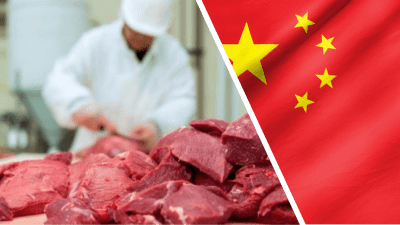THERE were no significant Chinese investment deals in the Australian food and agriculture sector in 2024, an annual report compiled by KPMG and the University of Sydney shows.
This year’s KPMG Demystifying Chinese Investment in Australia report suggests the nature of Chinese investment into Australia is shifting away from traditional acquisitions and towards greenfield investments.
 The latest report follows a recent trend, with no sign of significant Chinese investment deals (based on the report’s methodology) in Australia’s food and ag space since 2019 and 2020.
The latest report follows a recent trend, with no sign of significant Chinese investment deals (based on the report’s methodology) in Australia’s food and ag space since 2019 and 2020.
The 2020 KPMG report was the last to show significant Chinese investment in the Australian food and agribusiness sector, identifying investments worth A$101 million, or four percent of the total investment for that year. That was down from food and ag investment of $1529m a year earlier.
Chinese-imposed trade sanctions on several sub-sectors of Australian agricultural exports came into force from late 2020, and might stifle new Chinese investment activity in this sector in future, KPMG speculated at the time.
The annual report series compiled jointly by KPMG and the University of Sydney Business School and covers investments into Australia made by corporates (not individuals) with head offices based in the People’s Republic of China through mergers and acquisitions and joint ventures. The report does not track greenfield investments, or portfolio investments such as the purchase of stocks and bonds, which do not result in foreign management, ownership or legal control.
‘Real estate’ referred to in the report does not include residential apartments and private home purchases.
The report database includes direct investments recognised in the calendar year in which parties enter into legally binding contracts and if necessary, receive mandatory Foreign Investment Review Board and Chinese Government investment approvals. In certain instances, final completion and financial settlement may occur in a later year.
Neither commercial real estate nor food and agribusiness recorded any entries in 2024, using the report’s methodology.
In summary:
- Chinese investment in Australia increased 43pc to A$1.312 billion in 2024 – up from A$917 m in 2023
- 11 deals were recorded in Australia in total in 2024, worth $1.3 billion.
- 86pc of the total investment was in mining and 84pc of the money flowed to Western Australia.
- Chinese investment in Australia remains low compared to the highs of the 2010s boom and the growth of China’s overall foreign investment, which is focused on Belt and Road Initiative countries.
- Asia and Europe together accounted for more than half of all outward direct investment, while Sub-Saharan Africa saw the sharpest growth in Chinese investment.
Despite the increase, 2024 had the third-lowest investment value and number of transactions since 2006, only higher than 2021 and 2023.
The continued low level of investment in Australia contrasted with the growth of China’s overall foreign investment, or outward direct investment. China’s Ministry of Commerce reported a total ODI volume of US$144 billion in 2024, an increase of 10.5pc on the previous year.
Investment in the ASEAN region has grown relatively rapidly, increasing by 12.6pc compared to the previous year. Chinese enterprises made non-financial direct investments totalling US$33.7 billion in countries participating in the ‘Belt and Road’ initiative, a 5.4pc increase over the previous year.
Sub-Saharan Africa countries experienced the highest growth in Chinese investment.
Report co-author Professor Hans Hendrischke from the University of Sydney Business School said while the previous two decades saw Australia emerge as a top destination for Chinese outward direct investment, particularly across the 2010s, over the past five years there had been a notable drop in investment.
“This is line with global trends, with Chinese investment moving towards Southeast Asia and Belt and Road countries,” he said.
“Detailed US data on project-based Chinese ODI indicate that Chinese investment is shifting towards clean energy, manufacturing, IT and software services, mining, and retail-favouring technology-intensive industries in Europe and emerging markets in Southeast Asia,” Prof Hendrischke said.
“This fundamental shift has altered the nature of Chinese investment in the Australia market, and we do not expect to see a rebound in the near future,” he said.
Report co-author KPMG Australia Partner, Helen Zhi Dent said Chinese ODI in Australia remained subdued – with most deals in the mining sector.
“We are seeing a shift in how Chinese companies are investing in Australia: from asset acquisition to greenfield expansion. This is illustrated by Chinese companies establishing new operations in Australia, particularly in sectors such as automotive, industrial equipment, electric batteries and consumer brands. This evolution reflects China’s strategy to bring Chinese industrial and consumer products closer to international markets,” she said.
Mining dominated in 2024, accounting for 86pc of the total investment value into Australia, with nine deals totalling A$1.124b. This included two investments in gold, two in lithium, two in mineral sands, two in graphite and one in rare earth. Seven of the nine investments were made by privately owned enterprises.
The largest transaction was Zhaojin Mining Industry Co Limited’s acquisition of Tietto Minerals, totalling A$733 million. Although these investments were made to acquire an Australian business, the mining assets of seven deals are located overseas.
One renewable energy investment contributed 14pc or A$183 million, and one investment in the technology sector, in the area of payment solutions, accounted for A$5 million.

HAVE YOUR SAY